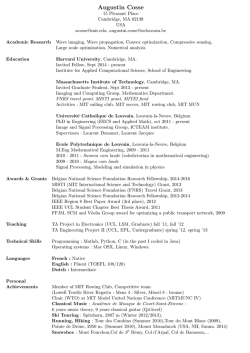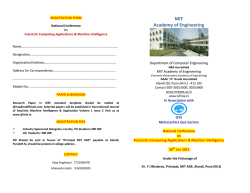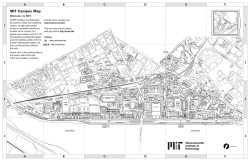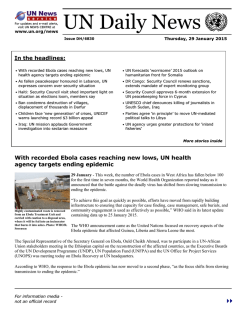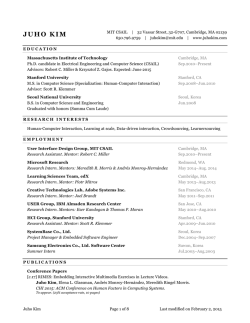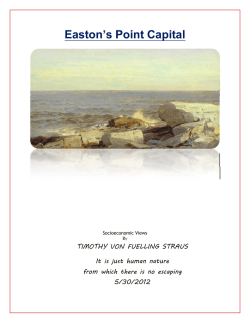
Curriculum Vitae - UCLA Department of Political Science
Curriculum Vitae Chad Hazlett Office: Department of Political Science University of California, Los Angeles 4289 Bunche Hall, Los Angeles, CA 90095-1472 http://www.mit.edu/∼hazlett [email protected] Academic Positions Assistant Professor of Statistics, UCLA, 2014-Present Assistant Professor of Political Science, UCLA, 2014-Present Education Ph.D., Political Science, Massachusetts Institute of Technology, 2009-2014. Dissertation: Inference in Tough Places: Essays on Modeling, Matching, and Measurement with Applications to Civil Conflict. Committee: Jens Hainmueller (chair), Fotini Christia, Adam Berinsky, Teppei Yamamoto Subfields: Political Methodology and International Relations M.P.P., Harvard University, Kennedy School of Government, 2004-2006. Concentration: Political and Economic Development B.S. with Distinction, magna cum laude, Duke University, 1998–2002. Major: Psychology; Concentration in Cognitive Neuroscience Research Interests Causal inference, machine learning, civil conflict, mass atrocities and genocide, experimental and quasiexperimental program evaluation, implicit measurement of sensitive attitudes Pre-Doctoral Fellowships Pre-doctoral Fellow (with Kosuke Imai), Dept. of Politics, Princeton, 2013-2014 Ford International Political Science Fellow, 2009-2013 Work in Progress “Kernel Balancing: A Balancing Method to Equalize Multivariate Densities and Reduce Bias without a Specification Search”. Available at www.mit.edu/∼hazlett. “KRLS: A Stata Package for Kernel-Based Regularized Least Squares” (with Jens Hainmueller & Jeremy Ferwerda). Available at www.mit.edu/∼hazlett. Under Review. “Angry or Weary? The Effect of Personal Violence on Attitudes Towards Peace in Darfur” Available at www.mit.edu/∼hazlett. “Enlightened Self-Interest? Estimating the Causal Effect of U.S. Disaster Aid on Political Support” (with Nicholas Miller). Chad Hazlett 2 Software “KRLS: An R package for Kernel Regularized Least Squares” (with Jens Hainmueller). KRLS is a statistical software that implements Kernel Regularized Least Squares. Also available for Stata (with Jeremy Ferwerda and Jens Hainmueller). http://www.mit.edu/∼hazlett/software.html Publications Peer Reviewed Articles “Kernel Regularized Least Squares: Reducing Misspecification Bias with a Flexible and Interpretable Machine Learning Approach” (with Jens Hainumeller). Political Analysis, 22(2). 2014 “The Epidemiology of Lethal Violence in Darfur: Using Micro-Data to Explore Complex Patterns of Ongoing Armed Conflict.” (with Alex de Waal, Christian Davenport, & Joshua Kennedy). Forthcoming in Social Science & Medicine. “Mechanisms of Moving the Mind’s Eye: Planning and Execution of Spatial Shifts of Attention” (with M.G. Woldorff). J. of Cognitive Neuroscience, 16(5). 2004. “Dorsal Anterior Cingulate Cortex Resolves Conflict from Distracting Stimuli by Boosting Attention Toward Relevant Events” (with D.H. Weissman, A. Gopalakrishnan, M.G. Woldorff). Cerebral Cortex. 15(2). 2004. “Effects of Practice on Executive Control Investigated with fMRI” (with D.H. Weissman, M.G. Woldorff, G.R. Mangun). Cognitive Brain Research, 15(47-60). 2002. “Functional Parcellation of Attentional Control Regions of the Brain” (with M.G. Woldorff, H.M. Fichtenholtz, D. Wiessman, A.M. Dale, A.W. Song). J. of Cognitive Neuroscience, 16(1). 2001. Book Chapters “Not On Our Watch: American Mobilization for Darfur” (with R.J. Hamilton). In War in Darfur and the Search for Peace, Alex De Waal (Ed.). Cambridge, Ma. Harvard University Press. 2007. News Media “Primed to Protest” (with Nicholas Miller). Foreign Policy.com. Sept, 2012. “India’s Other Terrorism”. Far Eastern Economic Review. Dec, 2008. Teaching Experience Teaching Assistant for Short Course on Causal Inference, Texas A&M. January 2014. Instructor: Teppei Yamamoto. Constructed and taught materials for laboratory component. (Scheduled) Teaching Assistant for Quantitative Research Methods IV. MIT Political Science, Spring 2013. Instructors: Teppei Yamamoto & Danny Hidalgo. Overall Rating: 7 (out of 7). Teaching Assistant for Quantitative Research Methods II: Advanced Empirical Methods. MIT Political Science, Spring 2012. Instructor: Jens Hainmueller. Overall Rating: 6.8 (out of 7). Instructor for “Math Camp”. MIT Political Science, August 2010 & 2011. Developed all teaching materials, lecture notes, handouts, and problem sets as first instructor for this course. Chad Hazlett 3 Invited Talks, Conferences First Annual Leila and Melville Straus 1960 Family Symposium on Early Warning for Mass Atrocities. Dartmouth, October 2014 American Political Science Association, Annual Meeting. Chicago, August 2014 Society for Political Methodology, Annual Summer Meeting. University of Virginia. July 2013 New Faces in Political Methodology Conference. Penn State, April 2013 Midwest Political Science Association, Annual Meeting. Chicago, April 2013 B-WGAPE (Boston Working Group on African Political Economy). MIT, November 2012. Applied Statistics Seminar (Institute for Quantitative Social Science). Harvard University, October 2012. MIT Strategic Use of Force Working Group. Sept. 2012; May 2013 Annual Meeting of the Northeast Methodology Program (NEMP). New York, May 2012. Midwest Political Science Association, Annual Meeting. Chicago, April 2012 Lecture for AM111 (Harvard), “Applied Mathematics: Scientific Computing”. Feb, 2012. MIT Graduate Student Works in Progress. Feb. 2012. Consultations and Field Experience Political Instability Task Force. 2012-present. Providing statistical analyses and forecasting models on variety of projects relating to mass killings and civil wars, using traditional and machine learning approaches. U.S. Institute of Peace. 2011. Contracted to assess existing genocide forecasting model and recommend improvements. Report available from U.S. Holocaust Museum at http://bit.ly/14MZbfI Research Assistance to Fotini Christia (MIT), Kenya. 2011. Conducted fieldwork for initial inquiry into effects of Somali piracy on markets in Nairobi. Interviewed negotiators, attorneys, and policy-makers involved in Somali piracy. U.S. Department of State, Chad. 2010. Field statistician in eastern Chad for “Darfurian Voices”, a project surveying over 2000 refugees, civilian leaders, and rebel leaders in refugee camps. Mass Atrocities Response Operations, Carr Center for Human Rights, Harvard. 2010. Tasked to produce report on the status of African countries and regional organizations on their preparedness to respond to mass atrocities. Genocide Intervention Network, Burma. 2008, 2010. Consultant to develop and evaluate a radio-based civilian early warning system in eastern Burma. African Union. 2009. Grant from the African Union Department of Peace and Stability to track and analyze levels of violence in Darfur in 2008-2009 using a variety of data sources from both the peacekeeping mission and media sources. Analyzed patterns of violence to help settle regarding nature of ongoing conflict. See works in progress, “The Epidemiology of Lethal Violence in Darfur: Using Event-Data to Explore Complex Patterns of Ongoing Armed Conflict”. Genocide Intervention Network, Sudan. 2007, 2008. Small-scale survey of IDPs in both government and rebel held territories of Darfur to determine the security risks they face. Worked with local partner and African Union peacekeeping forces to develop programs to improve camp security through improving patrols and by reducing need for firewood collection. 4 Chad Hazlett Zimbabwe Opportunities Industrialization Center, Zimbabwe. 2005. Conducted survey of small and mediumscale businesses able to survive economic crisis, shortages, and hyper-inflation to determine characteristics of resilient businesses. Hart Fellowship (Duke University), India. 2003-2004. Under Hart fellowship from Duke University. Conducted field research with Seva Mandir, an NGO in Rajasthan, India. Examined access to health care in rural areas; designed and launched health insurance program. Service Faculty Search Committees: • Political Science: methods (2010, student representative); comparative politics (2014) • Statistics: joint statistics & social science search (2014) Manuscript Referee: Journal of Causal Inference, Journal of Experimental Political Science, Journal of Genocide Research, Journal of Conflict Resolution January, 2015
© Copyright 2026
